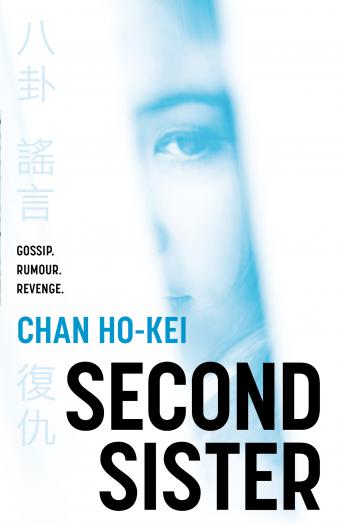Second Sister, by Chan Ho-kei
translated by Jeremy Tiang
Head of Zeus, 2020
Publisher's Blurb
Gossip. Rumour. Revenge.
Wun Wah Tower. Kwun Tong district, Hong Kong.
When Siu-Man jumped from her window on the twenty-second floor, everyone assumed it was suicide. But Sui-Man's sister, Nga-Yee, a quiet and unassuming librarian, is determined to prove it was murder. The police aren't interested in re-opening a solved case so she contacts a man known only as N. – a hacker, and an expert in cybersecurity and manipulating human behaviour.
What follows is a cat-and-mouse game through the vibrant city of Hong Kong. The pair's investigation takes them from creepy commuter-train gropers to Siu-Man's gossipy friends to the dark corners of the city's digital underground – where online bullies, sexual predators and shady tech businesses stalk their prey...
Reading Chinese Network Reviews
Reviewed by Michelle Deeter, 15/6/20
 Some books take a few chapters to warm up, while this book had me right at the start. Second Sister, written by Chan Ho-Kei and translated by Jeremy Tiang, is an gripping work of crime fiction. If you’re feeling down and you need something to rip you away from your day-to-day life, this is it.
Some books take a few chapters to warm up, while this book had me right at the start. Second Sister, written by Chan Ho-Kei and translated by Jeremy Tiang, is an gripping work of crime fiction. If you’re feeling down and you need something to rip you away from your day-to-day life, this is it.
The book takes place in modern-day Hong Kong and feels true to life. Nga-Yee is the elder sister in a poor family in Hong Kong. They struggle to make ends meet and live in an apartment provided by the government. Then she loses her parents—her father dies in a workplace accident, her mother dies of cancer—and Nga-Yee becomes the primary caregiver to her younger sister. Siu-Man is usually bubbly and social, but she becomes withdrawn after she reports someone groping her on the MTR (the Hong Kong subway). Trolls on the internet attack her, claiming she made a false report. When the case is settled out of court, Nga-Yee thinks that life can go back to normal. Siu-Man seems to be behaving like her old self. But Nga-Yee’s long working hours mean that she spends less and less time with her sister, who is still in high school.
Then Nga-Yee’s little sister kills herself just hours before Nga-Yee comes home. She is certain that someone goaded Siu-Man into jumping to her death. Nga-Yee wants justice. The police aren’t interested, and a private detective named Mr. Mok is unable to identify the author of a post who used clever techniques to hide his identity.
Nga-Yee is told to speak to a young maverick hacker detective named N. He is equal parts arrogant and talented, like a Sherlock Holmes turned up to 11. N’s fees are exacting: Nga-Yee has to empty her bank account to pay him. But they money would be worth it if N can deliver.
I can’t praise the book highly enough. The book is an absolute delight to read, and was expertly translated by Jeremy Tiang. I could go on, but it’s better if you stop reading reviews and hurry up and grab a copy.
Reviewed by Michelle Deeter
Reviewed by Angus Stewart, 28/4/20
 The UK edition of Second Sister is from Head of Zeus, a publisher with an amazing track record in translated Chinese sci-fi. HoZ expanded their horizons into Chinese crime fiction and indeed into Hong Kong with Chan Ho Kei’s The Borrowed, and have continued this thread with Second Sister, another Chan Ho Kei novel also brought into English by Singaporean translator extraordinaire, Jeremy Tiang.
The UK edition of Second Sister is from Head of Zeus, a publisher with an amazing track record in translated Chinese sci-fi. HoZ expanded their horizons into Chinese crime fiction and indeed into Hong Kong with Chan Ho Kei’s The Borrowed, and have continued this thread with Second Sister, another Chan Ho Kei novel also brought into English by Singaporean translator extraordinaire, Jeremy Tiang.
Second Sister is an ‘extremely online’ novel, not in the sense that it is written in absurdist Twitterese but in the sense that (almost) all of the crime and investigation it concerns itself with exists in the online or ‘networked’ dimension of our lives.
Its detractors seem to be most bothered by the disparity of the book’s two ‘detectives’. Nga Yee, the wronged party, is a tech illiterate. The mysterious detective she hires, codename ‘N’, is an internet mastermind. N takes Nga Yee ‘along for the ride’ as he hacks his way to the truth, which allows him serve as infodumper supreme whenever necessary. Perhaps Nga Yee is a little too offline to be believable, and perhaps N is a little too undefeatable, but if the reader can accept this little conceit they will definitely enjoy this extremely lucid trip through the underworlds, undercurrents, group chats, and IP addresses of modern Hong Kong. Fans of the TV show Mr Robot should find much to relish in N’s integrated investigative approach.
Just as in real life, ‘physical access’ and ‘social hacking’ are as key to N’s down-and-dirty method as hijacking webcams and securing admin privileges from afar. Fans of old-fashioned justice will surely be cheering on Nga Yee as she joins N on the hunt for the harasser who hounded her teenage little sister into a rooftop suicide.
My own particular take on this novel is that the black enigma at its core isn’t the social mystery driving the plot. The real mystery derives from character: who is N? This way of understanding the book makes a great deal of sense to me, since N is- as mentioned above- something of a flawless, almost godlike character. The more Nga Yee and the reader learn about N, the more apparent this godliness becomes. A reviewer with very fixed ideas about how novels and character development should work might argue that this flawlessness is a flaw. I would contend that whether or not N’s perfection is a pain, its strangeness hosts the power and pulse of this book. Readers will not realise until near Second Sister’s end just how central a role N has played in quite literally every plot strand.
In addition to plot and character, the novel has themes. One is social inequality, as manifested in Hong Kong. ‘Expat novel’ writers are unlikely to dip their toes into the worker/employee conflict and oppression which local writers like Chan Ho Kei do. That said, feelings of economic insecurity in Second Sister are vastly overshadowed by feelings of network insecurity. If you would like to get a sense of the number of passages by which a determined hacker could invade and ruin your life, you should probably read this book. And if you would rather not know…you should definitely read this book.
If you read for leisure rather than education, I will indulge you with my verdict. Listen closely, and trust your screen. I’m not trying to manipulate you when I say that this is an extremely engaging book, plotted masterfully by its author and rendered in witty, unobtrusive prose by its translator.
Reviewed by Angus Stewart
Reviewed by Lorna Amor, 18/4/20
 This book made me feel old. I was born in the late seventies; the internet for me is a place for research, browsing, passing time. My ancient iPhone is used only for calls and messages to and from people I know and sometimes, when I’m feeling modern and capable, the odd Instagram post. I have absolutely no technical knowledge of the workings of the internet or mobile devices. And I have no desire or attention span to learn.
This book made me feel old. I was born in the late seventies; the internet for me is a place for research, browsing, passing time. My ancient iPhone is used only for calls and messages to and from people I know and sometimes, when I’m feeling modern and capable, the odd Instagram post. I have absolutely no technical knowledge of the workings of the internet or mobile devices. And I have no desire or attention span to learn.
This book also made me feel uncomfortable. If you sort through the tangled webs of Second Sister, the crux of the novel lies in the vulnerability of a teenage girl, Siu-Man. She is molested, alienated at school, bullied online, emotionally neglected at home and is driven to take her own life. Her suicide is an utterly avoidable, distressingly real issue. Nothing in the telling of this tale makes this entertaining or enjoyable.
Chan Ho-Kei’s Second Sister opens with a compelling prologue. Financially struggling Au Nga-Yee returns home exhausted from work with only a thrifty meal plan on her mind and is met with the earth-shattering news that her sister Siu-Man, eight years her junior, has jumped to her death from their apartment window. Nga-Yee, implausibly behind-the-times even by my standards, joins forces with a somewhat cliched hacker, known only as ‘N’, a principled crusader with an overstated moral code and skewed sense of justice. Their well-worn combination of reclusive computer geek and clueless client ensures that they get to the bottom of Siu-Man’s problems and resolve to get revenge. Revenge fiction, it turns out, is not my cup of tea.
Nor is crime fiction without a crime. The police see no hint of criminal activity in the case and wash their hands of it in chapter one. Enter a private detective who also can’t help, but who leads us to the shadowy character, N. Together, Nga-Yee and N use the internet to dig into Siu-Man’s personal life and follow a virtual paper trail from her to the potential perpetrators of her downfall. Chan uses this trail to tell the story thoroughly from several different angles but in doing so creates a repetitiveness that is difficult to ignore. Towards the end the pace picks up as the plot reveals the twists and turns of more classic mystery fiction. But some twists prove too convenient. These and the occasional bizarre social scene and gratuitous flash of sexual deviance do nothing to entice me back in.
Diligent research has gone into the writing of Second Sister, both into the crafting of the plot and the filling out of technical detail (Chan has reportedly worked as a software engineer and game designer, which seems evident to a novice reader). The translation must also have required meticulous technical research. Prose and dialogue are punctuated with text messaging, social media posts, readers’ comments, IP addresses and so on. Innovative in style, maybe, but mainly just time consuming for the reader. Second Sister may hold ambitious motives to critique the internet and human nature, but this is frankly lost, and the message I got was a pessimistic view of the youth of today, meddling adults who ought to know better and the murky uses of the internet. If anything, reading about it felt like I was perpetuating the problem.
Having enjoyed Chan Ho-Kei’s The Borrowed (also translated from the Chinese by Jeremy Tiang), I was disappointed to derive no pleasure from the reading of this novel. I found the subject matter and the nature of the characters just too unlikeable, and the length of the book several hundred pages too long. I wanted more depth to the characters, to get a sense of who they were and why they were doing what they were doing. N is the character our attention is turned towards most, but it feels like misplaced interest, it should not be him at the centre of the story. I finished Second Sister with relief, and with the overriding desire never to read a reader’s comment online again.
Reviewed by Lorna Amor
Reviewed by Amy Matthewson, 30/3/20
 Nga-Yee arrives home to find a crowd gathered on the pavement and is devastated to learn that her fifteen year old sister, Siu-Man, had just committed suicide by leaping from their twenty-second floor window. Nga-Yee is understandably shocked. This tragedy is further punctuated by the fact that SiuMan was everything to her: her only family as both Mum and Dad passed away years before. Confused and heartbroken, Nga-Yee refuses to believe that her sister would commit such an act and hires a hacker and cyber security expert named N to investigate her case. N appears to be eccentric and a recluse; he is rude, charming, infuriating, highly intelligent, and a master at manipulation.
Nga-Yee arrives home to find a crowd gathered on the pavement and is devastated to learn that her fifteen year old sister, Siu-Man, had just committed suicide by leaping from their twenty-second floor window. Nga-Yee is understandably shocked. This tragedy is further punctuated by the fact that SiuMan was everything to her: her only family as both Mum and Dad passed away years before. Confused and heartbroken, Nga-Yee refuses to believe that her sister would commit such an act and hires a hacker and cyber security expert named N to investigate her case. N appears to be eccentric and a recluse; he is rude, charming, infuriating, highly intelligent, and a master at manipulation.
What follows is an intriguing game of who-dunnit. Readers are introduced to a host of characters and themes: a predator who looks for victims in crowded trains, high school hierarchies and teenage dramas, the fear Triad gang members instil in others, competition and incompetence in business, noodle shop owners, and friendly cleaners.
Within this world and among all the twists and surprising turns in the plot, Chan delves into deeper issues that bubble to the surface throughout the book. He explores contemporary themes such as the complexities of modern society, debates surrounding morality and ethical behaviour as well as cyberbullying, sexual assault, and the power of the Internet. Chan also touches upon universal themes of family, love, and revenge, challenging readers to question the varying ways in which we (mis)communicate our emotions not only in a digital age, but also in a highly competitive environment. Can revenge be justified? What is forgiveness? How do we express love – by providing financial support? …emotional support? Do we ever take the time to really listen and understand those we love?
N provides much of the thought-provoking dialogue. One of his many statements on modern society includes this observation: “We always talk too much and listen too little, which is why the world is so noisy.” What we all need to do is take the time to really listen to others and, as N argues, “only when we understand this will we finally see progress in the world.”
My only critique of Second Sister would be the ending, which took on a tone a tad too didactic. This does not, however, take away from the page-turning pleasure it was to read this book. A final but important comment: Jeremy Tiang did an excellent job in his translation, keeping the vibe and beat of Hong Kong alive in this exciting thriller.
Reviewed by Amy Matthewson
